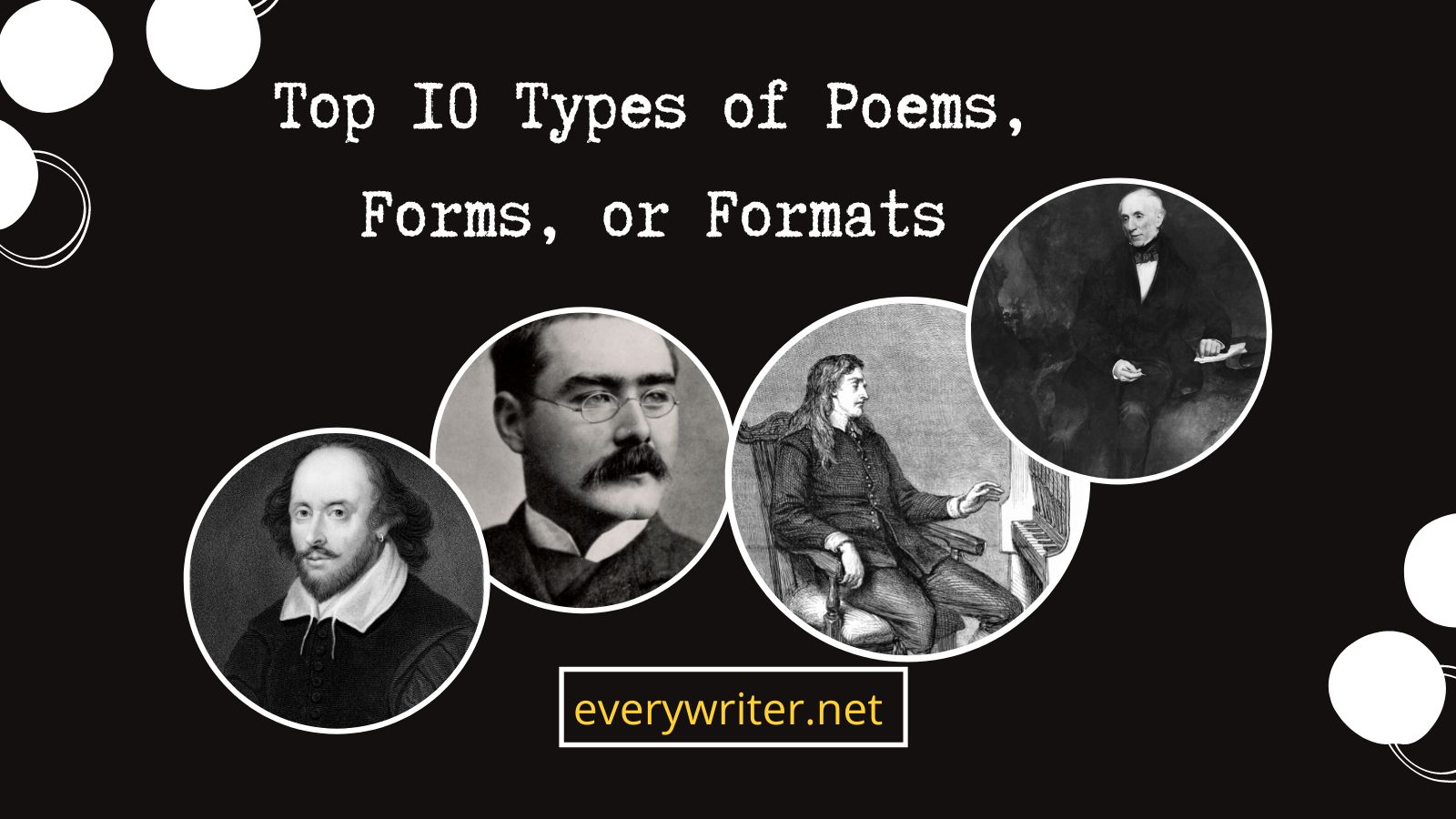Top 10 Types of Poems, Forms, or Formats
Here is a list of the Top 10 Types of Poems, Forms, or Formats. I say forms or formats because we cross some lines of distinction here that are only sometimes easy to explain. These are poems where people use a particular form to create them, but some are forms in and of themselves. I wanted to develop a short list of the most famous poetry types. Here is an essential guide. If someone throws these at you, at least you will know what they are. Please try each type, and if you do, feel free to share them in the comments. For more types of poems, forms and formats, please see 36 More Types of Poems, Forms and Formats.
The Forms
Free Verse
Refrain from being mixed up with blank verse; free verse is a poetic form/technique where the poet does not follow the conventions of any meter or rhyme. Free verse is just that, free. A form we think of when we write a poem not based on any patterns or structure. So you might think of this as form free.
It is undoubtedly the most common form used today.
Haiku
Haiku is the only poem that rivals free verse these days. People love Haiku. Haiku is very popular in Japan. Poets like Matsuo Bashō, Yosa Buson, and Natsume Sōseki are renowned for their Haiku. It’s 3 line poem generally where the first and last lines have five syllables, and the middle has seven.
Basic requirements:
- 5 lines
- 5 syllables
- 7 syllables
- 5 syllables
Examples:
10 Famous Haiku https://www.readpoetry.com/10-vivid-haikus-to-leave-you-breathless/
Sonnet
There are various sonnets, but the most popular ones tend to be the English or Shakespearean sonnets. Of course, there is much more to these, but this is the general definition. There is also the Italian or Petrarchan sonnet. The English sonnet is the most attempted.
There are many types of sonnets. The four most popular are:
Petrarchan
Named after Francesco Petrarca, it is sometimes called the Italian sonnet. It is generally written in iambic pentameter if written in English. The poem is made up of an Octave (an 8 line stanza ABBAABBA.) and a sestet (a 6 line stanza CDECDE or CDCDCD). Poets study their whole lives to perfect writing these types of sonnets. An excellent example of this type of sonnet is:
Composed Upon Westminster Bridge, September 3, 1802
William WordsworthEarth has not anything to show more fair:
Dull would he be of soul who could pass by
A sight so touching in its majesty:
This City now doth, like a garment, wear
The beauty of the morning; silent, bare,
Ships, towers, domes, theatres, and temples lie
Open unto the fields, and to the sky;
All bright and glittering in the smokeless air.
Never did sun more beautifully steep
In his first splendour, valley, rock, or hill;
Ne’er saw I, never felt, a calm so deep!
The river glideth at his own sweet will:
Dear God! the very houses seem asleep;
And all that mighty heart is lying still!
Shakespearean
Popularized by William Shakespeare, this is the most famous type of poem. It is a 14-line poem written in iambic pentameter. The poem will end in a rhyming couplet. It’s generally more complicated than it sounds. A famous example:
Shall I compare thee to a summer’s day?
Thou art more lovely and more temperate.
Rough winds do shake the darling buds of May,
And summer’s lease hath all too short a date.
Sometimes too hot, the eye of heaven shines,
And often is his gold complexion dimmed;
And every fair from fair sometime declines,
By chance or nature’s changing course untrimmed.
But thy eternal summer shall not fade,
Nor lose possession of that fair thou ow’st,
Nor shall Death brag thou wanderest in his shade,
When in eternal lines to time thou grow’st.
So long as men can breathe or eyes can see,
So long lives this, and this gives life to thee.
Spenserian
Named after famous poet Edmund Spenser this poem has three interlocked quatrains and a final couplet, with ABAB BCBC CDCD EE as its rhyme scheme. Again, harder than it sounds.
The famous warriors of the antique world,
Used Trophees to erect in stately wize:
in which they would the records haue enrold,
of their great deeds and valarous emprize.
What trophee then shall I most fit deuize,
in which I may record the memory
There are more kinds of sonnets, like the Miltonic and modern ones, but the three above are what people talk about when they say the word sonnet.
Blank Verse
Blank Verse is a poem written in Iambic pentameter but does not rhyme. It can follow another meter, but Iambic pentameter is the most common by far. Milton wrote his masterpiece Paradice Lost in blank verse:
Of Mans First Disobedience, and the Fruit
Of that Forbidden Tree, whose mortal taste
Brought Death into the World, and all our woe,
With loss of _Eden_, till one greater Man
Restore us, and regain the blissful Seat,
Sing Heav’nly Muse, that on the secret top
Of _Oreb_, or of _Sinai_, didst inspire
That Shepherd, who first taught the chosen Seed,
In the Beginning how the Heav’ns and Earth
Rose out of _Chaos_: Or if _Sion_ Hill
Delight thee more, and _Siloa’s_ Brook that flow’d
Fast by the Oracle of God; I thence
Limerick
Limerick is, at its core (giving the basic definition here) a 5 line poem that follows a strict meter and always has a AABBA rhyme scheme.
For example, Rudyard Kipling writes:
There was a small boy of Quebec,
Who was buried in snow to his neck;
When they said, “Are you friz?”
He replied, “Yes, I is—
But we don’t call this cold in Quebec.”
This verse from the Jungle Book is a good example of a limerick.
Tanka
Related in a sense to the Haiku, the Tanka poem is a poem with 5,7,5,7,7 for its lines. So it’s a Haiku with 2 seven-syllable lines added to the end.
Cinquain
At its very base, this is simply a 5 line poem. So The Tanka above falls into this classification. Still, the most popular Cinquain that people want you to write when you say, Let’s write a cinquain, is generally in English that follows a rhyme scheme of ababb, abaab, or abccb.
Sestina
It’s easier to write a sestina than to explain how to write one. So it’s a six stanza of six lines, each with a triplet at the end. Each stanza has the same six words at the end of each line of the poem. The words that end the first stanza’s lines are rotated over and over again at the end of the lines of the next stanza.
Villanelle
Here is another poem, but it takes more work to explain or write. The most famous one is Do Not Go Gentle into that Good Night by Dylan Thomas. The form is a 19-line poem that has five 3-line stanzas. The first line of the poem and the last line of the first stanza become a refrain (repeated) repeatedly until the final stanza. Lines 1 and 3 become the beginning and ending lines of all the other stanzas.
Acrostic
An Acrostic is a simple poetry form, newer than the rest on this page. The Acrostic is a poem that uses a poem’s up and down letters to spell a word or phrase. In this poem, the first letter spells a word.
Here is a list of the most popular poetry forms. These are classic forms used by authors throughout time. If you want to give them a try, we’d love to see them in the comments below. If we see one we like, we may ask you if we can publish them on our site.
[DISPLAY_ULTIMATE_SOCIAL_ICONS]
- 100 Winter Storm Writing Prompts - January 17, 2026
- 100 Haunted House Story Starters: Craft Your Scariest Tale Yet - January 10, 2026
- 160 Christmas Writing Prompts - December 21, 2025





What is a “cizoe’ poem?
It’s when you don’t rhyme at all and say nothing but words
I used to love poems. These days I find it difficult to concentrate on them. I guess I have become too busy
i write poems but i wasnt sure where my type falls in,now i know it falls under free verse category. Thank you for sharing.
Jenitha
I write different categories of poems which i didnt knw before thank u very much
I read poems a lot but I’m often confused about their types. I’m more familiar with sonnet, haiku and Limerick. Thank you for the enlightenment.
Find mines on lulu or amazon (for amazon search NAKED 13-30 BOOK)
Poems are children of poet that is why they reveal their parents behaviour.I am poet for and an author, Wait and see And prepare to read my upcoming book
Poems are children of poet that is why they reveal their parents behaviour.I am poet and an author, Wait and see And prepare to read my upcoming book
I agree with you. I’ll look for your books.
i found this really helpful
What is a limerick???
AABBA is a pattern in which the words rhyme, so the A’s rhyme and the B’s rhyme.
Half of these poems i didn’t even know were a thing 🙂
Poetry is hard
no way Stephen curry writes poems
Dude, Awesomely crazy poetry, ya got there/
I love sestinas even tho they are so hard to write.
I love that you talked about how Free Verse poems would be a technique that would not follow any conventions of meter or rhyme. I can imagine how nice it would be to be exposed to such work, especially when I appreciate words being used in such a creative way. Hopefully, I can find a Puerto Rican poet this time because I feel curious on how they take this kind of technique.
Haiku does not have five lines. It has three lines. And in America, because our language is not like Japanese, the rules are not the same. Tanka, however, does have five lines. So I don’t know which you are talking about.